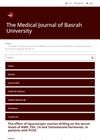
Male goat smell increases reaction in young female goats' noses but doesn't cause them to start puberty early.
September 2023 in “Diagnostics” Low vitamin D levels may affect ovulation and progesterone in infertile women.
 2 citations,
May 2006 in “Women's Health Medicine”
2 citations,
May 2006 in “Women's Health Medicine” PCOS is diagnosed when at least two of these three features are present: polycystic ovaries, irregular ovulation, and high androgen levels.
September 2002 in “Fertility and sterility” Metformin can start ovulation and may lower 17P response in PCOS, but six months is too short to improve hair growth or change body fat distribution.
 June 2019 in “The Medical journal of Basrah University”
June 2019 in “The Medical journal of Basrah University” Laparoscopic ovarian drilling helps infertile women with PCOS by improving menstrual regularity, ovulation, and chances of conception, and by changing hormone levels.
 19 citations,
October 2004 in “Best Practice & Research in Clinical Obstetrics & Gynaecology”
19 citations,
October 2004 in “Best Practice & Research in Clinical Obstetrics & Gynaecology” The diagnosis of polycystic ovary syndrome (PCOS) requires a detailed patient history, ultrasound scanning, hormone level checks, and assessments of ovulation, obesity, and insulin resistance. It's a variable condition that needs individualized management and is a significant risk factor for type 2 diabetes.
 135 citations,
April 2017 in “Advances in Clinical and Experimental Medicine”
135 citations,
April 2017 in “Advances in Clinical and Experimental Medicine” New treatments for PCOS show promise, including both medication and non-medication options.
 65 citations,
May 2010 in “Current Women's Health Reviews”
65 citations,
May 2010 in “Current Women's Health Reviews” Oxidative stress is a key factor in the development of Polycystic Ovary Syndrome, and weight management can improve symptoms.
 1 citations,
January 2017 in “International journal of women's health and reproduction sciences”
1 citations,
January 2017 in “International journal of women's health and reproduction sciences” Electroacupuncture improved symptoms of PCOS in a 19-year-old woman.
1 citations,
March 2005 in “SKINmed/Skinmed” Oral contraceptives can help treat skin issues like acne and excess hair.
 October 2022 in “Aesthetic Cosmetology and Medicine”
October 2022 in “Aesthetic Cosmetology and Medicine” PCOS often causes skin problems due to hormonal and metabolic imbalances.

Polycystic ovary syndrome (PCOS) affects about 10% of women, is often linked to obesity and family history, and can cause irregular periods, fertility issues, and other symptoms. It's usually managed with lifestyle changes, weight loss, and medication.
 March 2023 in “Journal of Education, Health and Sport”
March 2023 in “Journal of Education, Health and Sport” Women with Polycystic Ovary Syndrome have a higher chance of getting depressed.
 December 2022 in “Journal of Phytonanotechnology and Pharmaceutical Sciences”
December 2022 in “Journal of Phytonanotechnology and Pharmaceutical Sciences” Ayurvedic treatment helped a woman with PCOS become pregnant and have a healthy baby.
December 2016 in “Asian Pacific journal of cancer biology” PCOS is a hereditary disorder that can lead to diabetes and heart disease if not treated early.
 99 citations,
August 2003 in “Fertility and Sterility”
99 citations,
August 2003 in “Fertility and Sterility” Too much male hormone is the main cause of Polycystic Ovary Syndrome.
 1 citations,
January 2004 in “Elsevier eBooks”
1 citations,
January 2004 in “Elsevier eBooks” Polycystic Ovarian Syndrome (PCOS) is a common condition causing fertility issues and other symptoms, with unclear causes and treatments focused on improving insulin sensitivity.
 December 2022 in “OBG Management”
December 2022 in “OBG Management” The conclusion is to diagnose PCOS with just hyperandrogenism and irregular periods, and treat with lifestyle changes and basic medications.
 October 2021 in “Journal of Advanced Biomedical and Pharmaceutical Sciences”
October 2021 in “Journal of Advanced Biomedical and Pharmaceutical Sciences” Vitamin D helps improve PCOS by aiding insulin function and ovarian health.
 62 citations,
August 2018 in “Frontiers in Endocrinology”
62 citations,
August 2018 in “Frontiers in Endocrinology” Androgens are important for normal ovarian function and estrogen production, but may not be the main cause of follicle death.
60 citations,
June 1997 in “Baillière's clinical obstetrics and gynaecology” PCOS is often caused by hormonal imbalances that can lead to various health issues and may indicate a risk for future metabolic and cardiovascular problems.
9 citations,
February 2007 in “JAMA” PCOS is a common inherited condition causing cysts, irregular periods, and increased diabetes risk in women.
 July 2021 in “International Journal of Homoeopathic Sciences”
July 2021 in “International Journal of Homoeopathic Sciences” Certain factors can trigger hormonal imbalances and cyst formation, leading to Polycystic Ovarian Syndrome (PCOS).
 89 citations,
November 2014 in “Medical Clinics of North America”
89 citations,
November 2014 in “Medical Clinics of North America” Eating 500 fewer calories a day and making lifestyle changes can improve PCOS symptoms and reduce diabetes risk; more research is needed on its causes and treatments.
48 citations,
March 2005 in “PubMed” Some plant-based compounds might help control the growth of new blood vessels if further research confirms their effectiveness.
 40 citations,
January 2010 in “Annales D Endocrinologie”
40 citations,
January 2010 in “Annales D Endocrinologie” The French Endocrine Society suggests diagnosing PCOS with two of three signs, recommends lifestyle changes and clomiphene for treatment, and calls for more research on certain treatments and tests.
28 citations,
January 2017 in “Obstetrician & gynaecologist/The obstetrician & gynaecologist” The document concludes that managing PCOS effectively requires considering ethnic differences, obesity's impact, and ethical concerns in treatment approaches.
 4 citations,
June 2007 in “PubMed”
4 citations,
June 2007 in “PubMed” Effective management of PCOS includes lifestyle changes, medication for menstrual regulation, fertility treatments, and cosmetic issue remedies.
 3 citations,
December 2011 in “Journal of Gynecologic Surgery”
3 citations,
December 2011 in “Journal of Gynecologic Surgery” Three to five ovarian punctures are best for improving fertility in women with PCOS without harming the ovaries.
 2 citations,
November 2020 in “Fertility Research and Practice”
2 citations,
November 2020 in “Fertility Research and Practice” The survey helps identify menstrual irregularities and excess male hormones, aiming to detect conditions like Polycystic Ovary Syndrome.






















